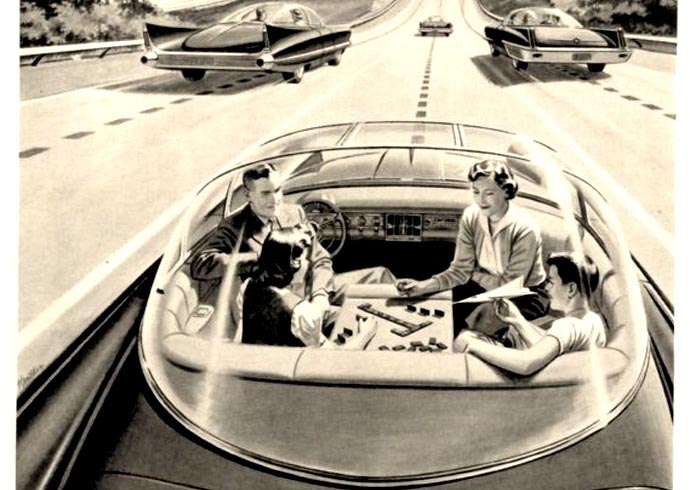
The UN expects that by 2050, the global urban population will be 6.3 billion – the same size as the world’s total population was in 2004. Quite apart from the demand on natural resources, there is unlikely to be the road space to cope with this explosive level of growth. The automotive industry believes that driverless technology represents the key to the survival of the car in the crowded mega cities of the future – a veritable panacea to the problems caused by today’s fleet of cars.
Worried about local air pollution? Driverless cars will be electric. Concerned about the deadly risk that motorised vehicles pose to pedestrians and cyclists? Software will remove human error. Sick of limited parking? No problem – driverless cars will simply cruise the streets until you’re ready for your return journey. Bored of congestion? Relax – sit back and watch a film or browse the internet.

If you think this all sounds too good to be true, you’re not alone. Christian Wolmar is an award-winning writer and broadcaster specialising in transport: “People say we’ve got 1.25m people killed on the world’s roads every year across the world – we will remove that danger – remove it with this technology. I’m not sure these driverless cars will ever be developed in the way that they envisage. There’s no guarantee that they actually will be safer. They will still have software that is programmed by human beings. The cars will still be on the roads in potential collisions.”
Christian Wolmar appears in our crowdfunded documentary Stop Killing our Children, which can be viewed in full on Vimeo
There are good reasons to be sceptical about the claims made by evangelists for a high-tech car future. Car companies will have you believe they are here to help – by designing for us products that are environmentally benign and even uncrashable. These empty promises are a distraction. Talk of driverless cars is less about transforming the status quo than maintaining it, fudging any path to progress.
We need fewer cars, not fewer drivers.
The ethical choice
The ETA was established in 1990 as an ethical provider of green, reliable travel services. 30 years on, we continue to offer cycle insurance, travel insurance, breakdown cover and home insurance while putting concern for the environment at the heart of all we do.

Vincent Edwards
I often hear that electric cars are the solution. Yet regardless the fuel which powers them, all vehicles cause congestion. Driverless cars cruising around (because there is nowhere for them to park) will only aggravate the problem. Car ownership gets cheaper in real terms all the time, while the cost of public transport has risen astronomically. Even walking is increasingly difficult as motorists have taken over pavements for their own purposes. The solution? Higher taxes on motoring may be undemocratic and unpopular, but I haven’t heard a better suggestion. Let’s start with those Chelsea tractors which are far too big for British roads anyway.
Anthony Powell
Imagine: instead of paying for parking, you can send your car home, to return for you later. Twice the milage for the same effect! A recipe for road charging when the council can’t raise funds from parking charges.
Imagine: send the car to pick up your kids from school, and bring them home; to enter your autonomic house and be waited on by robots, all while you’re sunning it in the Bahamas!